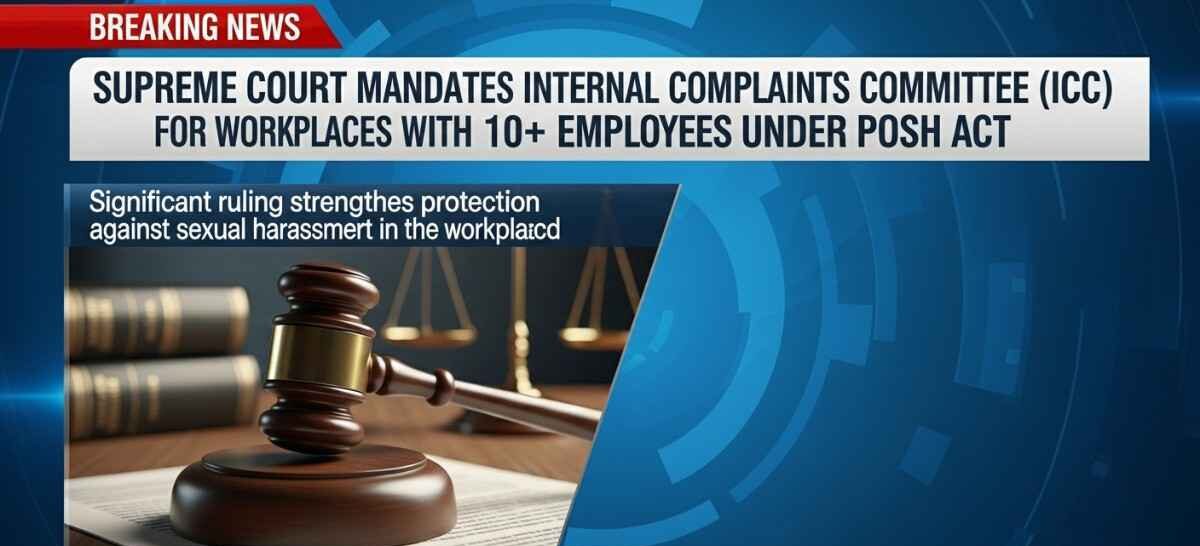Learn about the Supreme Court’s mandate on Internal Complaints Committees (ICCs) under the POSH Act, including compliance rules, penalties, and workplace benefits.
Introduction
The Supreme Court of India has recently reinforced workplace compliance by directing that all organizations with more than ten employees must establish an Internal Complaints Committee (ICC). This mandate falls under the POSH Act, 2013 (Prevention of Sexual Harassment of Women at Workplace Act), which was introduced to safeguard employees—particularly women—against sexual harassment at work.
Despite the Act being in place for over a decade, many companies have either ignored or delayed compliance with it. With this directive, employers must act swiftly to form ICCs and provide proof of compliance to local labour authorities.
What is an Internal Complaints Committee (ICC)?
The Internal Complaints Committee (ICC) is a statutory body within an organization, established to address and resolve complaints of workplace sexual harassment.
Key Functions of ICC:
- Receive and investigate complaints.
- Conduct inquiries in a fair, confidential, and time-bound manner.
- Recommend action against the harasser (warning, suspension, termination, etc.).
- Submit annual reports to the district officer.
Composition of an ICC
As per the POSH Act, the Internal Complaints Committee (ICC) should be composed of:
- Presiding Officer – A senior woman employee in the workplace.
- Two Employee Members – Individuals committed to women’s welfare or with legal/social work experience.
- External Member – From an NGO or association dedicated to women’s rights, ensuring impartiality.
This structure ensures transparency and fairness in dealing with workplace harassment complaints.
Why Did the Supreme Court Reinforce This Mandate?
Even though the POSH Act was enacted in 2013, compliance has been poor across industries. Many organizations either do not have an ICC or have not reported their committee’s formation to authorities.
The Supreme Court directive makes it clear that organizations cannot delay compliance any longer. Employers must now:
- Establish ICCs without delay.
- Provide proof of ICC formation to local labour authorities.
- Ensure periodic training and awareness sessions for employees.
Penalties for Non-Compliance with ICC Rules
Non-compliance with the ICC mandate may lead to:
- Fine up to ₹50,000 for the first violation.
- Higher fines for repeated violations.
- Cancellation of business licenses in extreme cases.
- Reputational damage and civil liability if cases of harassment remain unaddressed.
Benefits of Having an ICC in the Workplace
- Creates a safe and inclusive environment for employees.
- Reduces risk of litigation and financial penalties.
- Builds employee trust and confidence in workplace policies.
- Strengthens the organization’s image as a compliant and responsible employer.
FAQs on ICC Compliance
Is ICC mandatory for all companies in India?
Yes, every workplace with more than 10 employees must establish an ICC under the POSH Act.
2. Who can file a complaint with ICC?
Any employee (woman or otherwise, as per recent interpretations) who experiences sexual harassment at work can approach the ICC.
What is the timeline for inquiry under ICC?
As per the POSH Act, the Internal Complaints Committee must resolve complaints within 90 days.
Can non-compliance affect business operations?
Yes, repeated non-compliance may lead to cancellation of business licenses and reputational damage.
Conclusion
The Supreme Court’s mandate is a wake-up call for Indian employers. Every workplace with more than 10 employees must form an Internal Complaints Committee and ensure compliance with the POSH Act, 2013. Not only is this a legal obligation, but it also helps build a safer, inclusive, and more productive workplace.

























